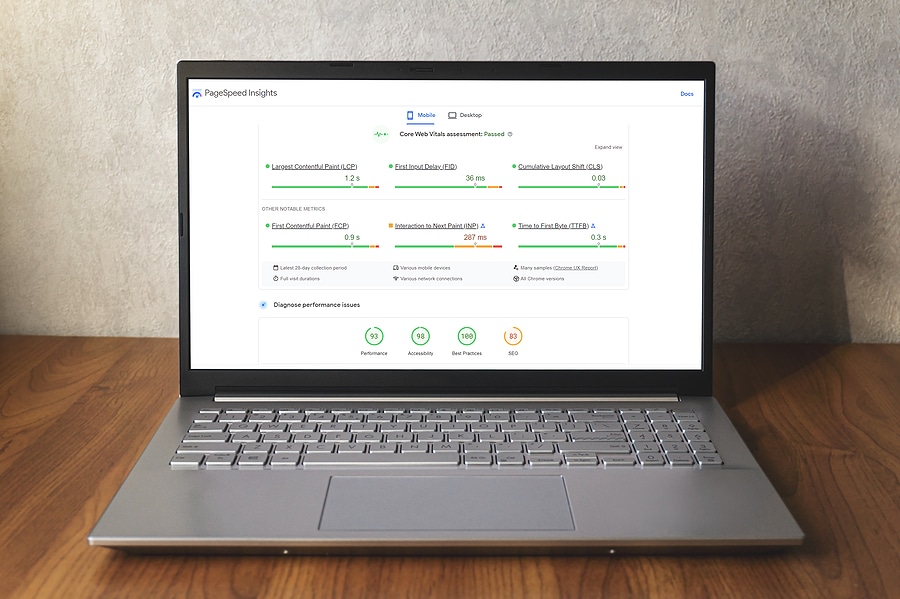
Show Up Where It Matters: Local Search Engine Optimization
By Jocelyn Van Saun
September 12, 2023
Local search engine optimization (SEO) is the practice of optimizing your website to rank higher in search engine results pages (SERPs). It’s especially important for dental practices because, as we stated in part one, most people search for dental services online before making an appointment.
Let’s discuss some tactics to increase your SEO.
Claim Your Google Business Profile
Google Business Profile (GBP), also known as Google My Business, is a free tool that allows you to manage your business’s online presence across Google, including search results and Google Maps. Claiming and optimizing your listing can help your practice appear in the “Local Pack” of search results, the list of businesses that appear beneath the map in Google search results. This significantly increases your visibility and attracts more local clients. Make sure to include your practice name, office address, website URL, phone number, hours of operation, photos, and services in your listing.
To create your GBP, you need to have a Google account and claim your business.
- Sign into Google. If you don’t have one, you can create one for free.
- Click “Manage now” to begin the process of claiming your business.
- Enter your business information. If your business is already listed on Google, you may be able to claim it by clicking the “Claim this business” button.
- After you’ve entered your business information, Google will ask you to verify your business. You’ll need to provide a physical address where Google can send a verification code, which you’ll need to enter to verify your business. Depending on your business category and location, you may also have the option to verify your business by phone or email.
- Once your business is verified, you can complete your GBP by adding more business information. You can also add photos, respond to customer reviews, and use Google’s features to connect with customers.
Make sure to keep your profile up-to-date and engage with customers through Google’s features to build a strong online reputation. Overall, GBP is an essential tool for any dental practice looking to improve its online presence and attract more local clients.
Optimize Local Keywords
Using local keywords in your website content, like page or blog copy, can help your dental practice rank higher in local SERPs.
Local keywords are words or phrases that include the name of your city or neighborhood, as well as other geographic identifiers that are relevant to your location. For example, if you’re a dentist in Salt Lake City, you might use local keywords such as “Salt Lake City dentist,” “dentist in Salt Lake City,” or “Salt Lake City dental office,” in your website content. This will signal to search engines that your dental practice is relevant to local searches and improve your chances of ranking higher.
Again, when using local keywords in your website content, it’s important to do so in a natural and contextually relevant way. Avoid “keyword stuffing,” or overusing local keywords in your content to manipulate search engine rankings. Google will notice if you are writing for search engines, rather than humans, and will dock your search engine ranking because of this.
Instead, focus on creating high-quality, informative content that includes local keywords strategically in a way that makes sense for your users and provides value to them.
It could be in page titles, headings, or meta descriptions. When you do so in the body of your content, make sure it feels natural. If you don’t want your content to sound too “buzzword-heavy,” try using some synonyms or related terms to create some variety.
The takeaway from this section should be that you don’t have to sacrifice authenticity for search engine rankings. You can still use keywords in copy that’s written naturally. Write in a conversational tone – the same one you’d use when you’re actually speaking with a client in person. That will 1) read better, 2) speak to search engines, and 3) create a feeling of familiarity between you and your clients.
NAP Consistency
NAP stands for Name, Address, and Phone number and is an important factor of SEO. Having consistent NAP information across all online directories and listings helps search engines understand that your dental practice is a legitimate business with a physical location. Inconsistent NAP information can cause confusion and lead to a lower ranking in local search results.
To ensure NAP consistency, search for your dental practice online and make note of all the directories and listings where your business is listed. If you find any inconsistencies in your NAP information, such as variations in your practice name, address, or phone number, correct them.
Regularly monitor your online listings to ensure that your NAP information is still accurate and up-to-date. If you move your practice or change your phone number, update your listings as soon as possible.
Okay, we know your first thought is probably, “I don’t have time to do that.” We hear you!
That’s why we recommend finding the right marketing partner to take care of it for you. Socius Marketing’s first step when we’re connected with a new practice is running a free online assessment where we analyze their current online presence, NAP information included, and where there might be room for improvement.
Backlink Building
Backlinks, also known as inbound links, are links from other websites that point to your website. Search engines like Google view them as a vote of confidence in your website’s authority, credibility, and relevance.
Being linked to by other websites with strong Domain Authority (DA), or ranking potential, in turn, increases your DA. While DA is not a direct ranking factor used by search engines like Google, it is a useful indicator of a site’s overall SEO strength. Comparing the Domain Authorities of your site and your competitors can help you assess your relative visibility and identify areas for improvement.
Here are some strategies for building backlinks for dental practices:
- Guest blogging: Reach out to other dental-related blogs and offer to write a guest post. In return, you can include a link to your website in your author bio.
- Local directories: Submit your practice to local directories such as Yelp and the Yellow Pages. And remember, make sure that your NAP (name, address, phone number) is consistent across all directories.
- Associations and organizations: Join dental associations or organizations and request that your practice be included in their member directory.
- Sponsorship: Consider sponsoring local events or charities, and ask that they include a link to your website on their event page or sponsor list.
- Interviews and press releases: Reach out to local media outlets and offer to provide an interview or press release about your practice. This can help to build credibility and earn backlinks from authoritative sources.
- Social media: Share your content on social media (we’ll get into this more later) and encourage others to share it as well. This can help to increase the visibility of your content and earn backlinks from social media profiles.
Authentic, Original Content
Search engines prioritize unique and high-quality content when ranking websites. By creating original content that provides value to your target audience, you can improve your search engine rankings and attract more organic traffic to your website.
Not sure where to include this content?
- “About Me” Page: Tell website visitors who you are as a practitioner, how your practice got started, and highlight your team. Information about your team and their qualifications helps establish trust with potential clients.
- Dental Blog: Consider positioning your website as an important resource for educating and informing clients about dental procedures, treatments, and best practices.
- Practice-Specific Content: Differentiate yourself even further by creating content that’s specific to your practice, like a section titled, “Get To Know Us” where you feature a profile on a different member of your staff every month. Or say it’s March, Women’s History Month, and create a blog post, “The Women of [Dental Practice Name]” where you ask to do a Q&A with, or write mini-features on, each of the women in your office.
- Procedure Walk-Throughs: Clients want to know what they’re signing up for when they schedule a procedure, like benefits, potential risks, what they need to do to prepare, how long it will take, what the procedure entails, and what the recovery process and timeline will look like. You’re the expert, why not share your knowledge to build trust, transparency, and esteem?
- Events/Programming: Consider writing about local programming or events you’ve been involved with. This will show your network that you are active in your community and are passionate about its members’ well-being outside of your day-to-day practice.
- Client Success Stories: Sharing client success stories, just like positive reviews and referrals, is also specific to your practice and will help build credibility.
By creating original blog posts on complex dental concepts in an easy-to-understand way, you can help clients make informed decisions about their dental care, differentiate your practice in a crowded marketplace, and position yourself as a thought leader in the industry.
All-in-all, when sharing content for your dental website, it’s important to focus on quality over quantity. Rather than churning out generic content that’s been covered elsewhere, aim to create content that’s original, insightful, and provides real value to your target audience (as discussed above). And speaking of target audience …
Next Steps:
Do you know what the best way to reach your target audience is? And how you can make the most of your digital marketing budget? The answer to both is paid advertising.
In part three of our five-part series, we’ll expand on how paid advertising, when combined with other marketing tactics, such as SEO, practices can create a comprehensive marketing strategy that delivers results and helps them achieve their business goals. Stay tuned or download the full guide below.
If you’d like to learn about how Socius Marketing can help your dental practice show up where it matters, schedule a consultation here.


